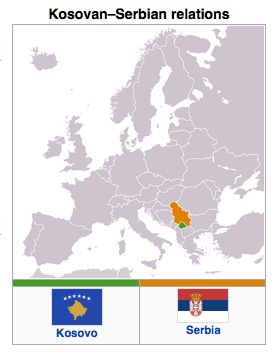Kosovo And Serbia Leaders Trade Barbs At UN
By Fatmir Aliu and Marija Ristic
Meeting for the first time together at the UN, Prime Ministers Hashim Thaci and Ivica Dacic traded accusations – though both sides did pledge to continue EU-led talks.
Serbia and Kosovo leaders, meeting at the United Nations, pledged to honour the agreements they have reached under EU auspices – but traded blame over problems in the Serb-run north of Kosovo and numerous other issues.
The Prime Ministers of Kosovo and Serbia were addressing the Security Council on Tuesday during the debate on the latest report of the Secretary General on the former Serbian province.

Speaking at the debate, Ivica Dacic and Hashim Thaci accused each other of conducting a destructive policy.
Speaking for the first time before the Security Council, Serbia’s new Prime Minister reiterated that Belgrade will never recognise the independence of its former province.
“Serbia will never and under any circumstances accept Kosovo’s unilateral independence and on that issue our nation remains united,” Dacic said.
However, since March 2011, the EU has been facilitating a technical dialogue between Kosovo and Serbia, aimed at normalizing the relationship between the parties.
So far, the two sides have reached deals on freedom of movement, integrated border management, mutual recognition of university diplomas and representation of Kosovo at regional meetings.
However, Pristina has accused Belgrade of putting most of the agreements on hold.
Dacic said that Serbia will respect the deals reached between Belgrade and Pristina under the EU-facilitated dialogue.
Meanwhile, he added that Serbia will continue to oppose Kosovo’s efforts to join international organizations and thanked UN member states that haven’t recognized Kosovo.
From the other side of the room at the UN, Kosovo’s Thaci said the independence of Kosovo was irreversible and thanked UN member states that have recognized its statehood, adding that blocking the process endangered peace and stability in the region.
So far, 90 UN member states, including 22 EU countries and the US, have recognized the country since it declared independence in 2008.
The two leaders also clashed over the issue of the plans of the International Steering Group.
The group of 25 states, which have overseen Kosovo’s progress since it declared independence, recently said the country had now implemented the provisions of the UN Comprehensive Settlement Proposal, known as the Ahtisaari Plan.
As a result, they were ready to agree to end the period of supervised independence and accord Kosovo full independence, which is due to be marked at a ceremony in Pristina on September 10.
Dacic said Serbia opposed the withdrawal of the International Steering Group and accused Kosovo of undermining the importance of the UN in Kosovo.
He also said that if the EU rule of law mission, EULEX, could not deal with the situation in Kosovo, the UN should reconsider reorganization of the former UN-led force, UNMIK.
Thaci in turn urged Serbia to withdraw its police and security forces from the Serb-run north of Kosovo.
The quarterly report of Secretary General Ban Ki-moon on Kosovo urged leaders in Belgrade and Pristina to demonstrate a constructive attitude in overcoming their problems and noted the need for genuine outreach towards the Serb-run north of Kosovo.
